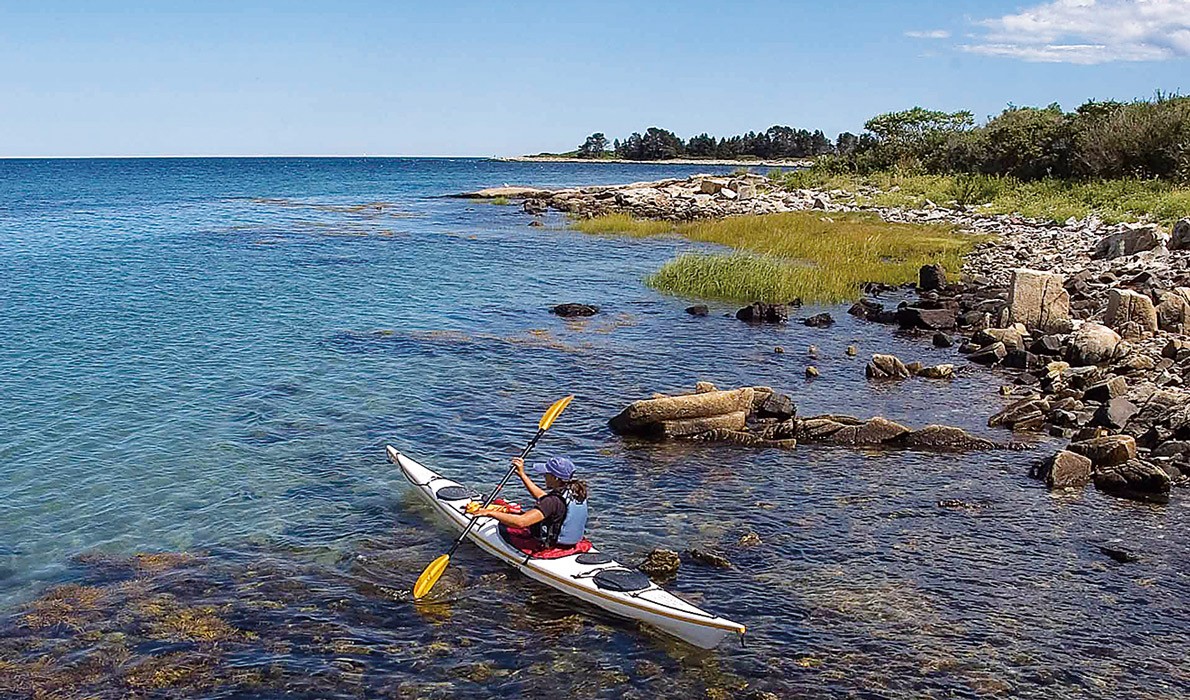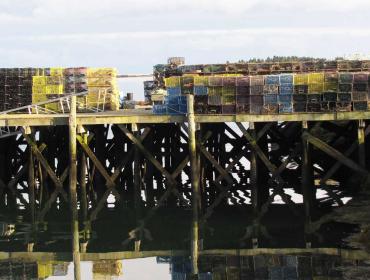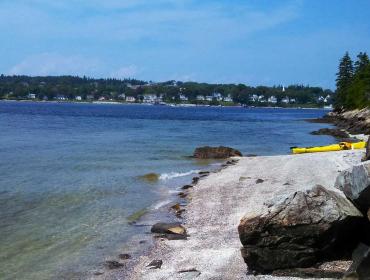Posted June 18, 2018
Last modified July 3, 2018
By Doug Welch
The Maine Island Trail Association marks its 30th anniversary this month, and I believe it is important to look back at our roots and the organization that once spawned and still inspires us—the Island Institute.
This story begins a “generation” before the Island Institute in the 1970s and 1980s when Maine’s islands experienced something of a renaissance. After centuries of use for fishing, farming, logging, and quarrying, the 20th century found many of the islands abandoned. In the 1970s, the state catalogued all Maine islands and reclaimed ownership of many. The result was the state owning some 1,300 islands and lesser coastal features, and in the 1980s it began considering their proper use.
Around this time, an island near Vinalhaven generated a wave of island and small boat enthusiasts: Hurricane Island. Those who experienced the birth of both MITA and the Island Institute frequently cite the Hurricane Island Outward Bound School, which operated in Penobscot Bay from 1964-2006, as the taproot of both organizations. With its outdoor leadership programs, including solo expeditions and rough camping on remote islands, countless people got interested in boats, islands, and Maine coast adventure through Hurricane Island.
One of those people was Philip Conkling. His seminal 1981 book, Islands in Time, celebrated islands large and small along the Maine coast, both reflecting and furthering their renaissance. In 1983 Conkling established the Island Institute as a division of the Hurricane Island school with a mission “to act as a catalyst to increase communication between the disparate individuals and organizations who care deeply about the future of the Maine islands.”
The fledgling Island Institute’s first contract was to assist the Maine Bureau of Public Lands in determining the recreational value of its island holdings. Conkling had been the principal investigator on a U.S. Forest Service research project studying the impacts of camping and hiking on fragile environments. He and Ray Leonard surveyed half of Maine’s state-owned islands in 1985. For the second half, Conkling asked Dave “Getch” Getchell Sr. to lead the effort. A life-long outdoorsman and recreation writer and editor, Getch had served as an editor at the Institute since 1985. With his extraordinary knowledge of small boats and the coast of Maine, he was a natural for this job.
The team determined that approximately 40 of the state-owned islands were in protected waters and large enough to camp on, representing an extraordinary new resource for outdoor recreation. Without resources to manage these remote campsites, however, the Bureau of Public Lands was hesitant to publicize this finding. That is when Getch had the powerful idea for “user management” of the islands by an organization that could instill an ethic of responsible use.
In 1987, Getch wrote an essay called “Island Trail” in the Institute’s Island Journal. Getch’s big idea was that Maine’s state-owned islands could be strung together like pearls on a necklace to create an outstanding waterway for small boats (the Maine Island Trail) that could be managed by the people who used it (Maine Island Trail Association).
While Getch and a rapidly growing band of followers focused on establishing the Maine Island Trail among the smaller, uninhabited islands, the rest of the Institute’s efforts focused on larger, populated islands. The missions and associated programs of MITA and the Institute gradually diverged.
In January 1993, the Institute’s board voted to allow MITA to withdraw and become an independent organization. It was a challenging period for all involved, but both organizations have thrived in pursuit of separate missions.
In recent years, a new sense of partnership between the two organizations has flourished as they find ways to complement and support each other. MITA is helping support the Institute’s work with island-based businesses and the organizations collaborated on a major cleanup of Isle au Haut beaches in 2016.
Two years ago, MITA invited Nick Battista, a long-time MITA member, volunteer, and former intern, to join the board. Battista credits his experience with MITA as helping to shape a career that has included a stint in Washington D.C. working for Rep. Chellie Pingree. Battista now works at the Island Institute, providing policy support for the organization’s work.
While our predecessors wrestled with organizational coming-of-age conflicts, the MITA staff today enjoys a great relationship with the Institute and a strong sense of mutual appreciation.
MITA applauds the work of the Island Institute on working waterfronts, economic development, community development, and environmental policy in Maine and beyond. And as MITA marks its 30th anniversary, we celebrate our shared roots, our shared coast, our common members, and the excellent relationship we enjoy today.
Doug Welch is MITA's executive director, and this essay first appeared in the oreganization's newsletter in longer form. MITA is grateful to Dave Getchell Sr., Philip Conkling, Peter Willauer, Steve Spencer, Sharon McHold, Nick Battista and Rob Snyder for contributions to this story.



